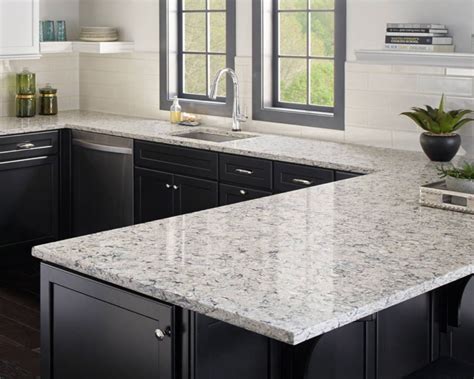
When it comes to selecting the perfect countertop for your kitchen or bathroom, quartz has become a popular choice for homeowners. With its stunning aesthetics, durability, and eco-friendly properties, quartz countertops offer a range of benefits that make them worth considering. In this article, we will explore everything you need to know about quartz countertops, from their composition to their environmental impact and pricing. Let’s dive in!
Quartz Countertops: More Than Meets the Eye
Quartz Countertops Aren’t Solid Quartz:
Contrary to what the name suggests, quartz countertops are not made entirely of solid quartz. They are engineered stone surfaces that comprise approximately 90-95% crushed quartz, bound together with resins, polymers, and pigments. This manufacturing process allows for a wide range of colors, patterns, and designs, making quartz countertops highly versatile.
All Quartz Countertops Essentially Flow From One Source:
The majority of quartz countertops available on the market today are manufactured by a few major companies. These companies source the raw materials globally and use their specialized machinery to create consistent and high-quality quartz slabs. This ensures that the final product meets strict standards of excellence.
Quartz Has a Cheese Connection:
The production process for quartz countertops is inspired by a method used in the cheese industry. The Italian company Breton developed the patented Bretonstone technology, which combines crushed quartz with resins under high pressure and heat. This results in a surface that is not only beautiful but also incredibly durable.
Quartz Countertops: Eco-Friendly and Cost-Effective
The Term Bretonstone Is Not Derived From French:
Although the name “Bretonstone” may sound French, it is not derived from the French language. It is named after the Breton region in Italy, where the Bretonstone technology was developed. This innovative process revolutionized the countertop industry and continues to shape the production of quartz countertops worldwide.
Quartz Countertops Are Eco-Friendly:
If you’re conscious about the environment, quartz countertops offer a sustainable choice. The manufacturing process utilizes recycled materials, and the durability of quartz means it requires minimal maintenance and replacements. Furthermore, quartz countertops don’t need to be sealed like other natural stone surfaces, reducing the use of chemicals over time.
You Often Walk on Quartz:
Quartz isn’t just limited to kitchen and bathroom countertops. Due to its exceptional durability and resistance to wear, it is commonly used as flooring material in high-traffic areas like shopping malls, airports, and hotels. So, the next time you walk across a sparkling floor, you may just be stepping on quartz!
Quartz Countertops vs. Granite: The Changing Landscape
Quartz No Longer Competes With Granite:
While granite was once the go-to choice for countertops, quartz has gained significant popularity in recent years. Its versatility, durability, and lower maintenance requirements have positioned it as a preferred option for many homeowners. Quartz offers a wider range of colors and patterns, making it easier to find a perfect match for your aesthetic preferences.
More Quartz Means Lower Granite Prices:
The increased demand for quartz has impacted the granite industry as well. With more manufacturers focusing on quartz production, the supply of granite has exceeded demand, leading to a decrease in prices. So, if you’re considering granite countertops, now might be an opportune time to take advantage of competitive pricing.
Quartz Is a Relatively Pricey Option:
Although quartz has become more affordable due to market dynamics, it is still considered a relatively pricey option compared to other materials. The quality, durability, and aesthetic appeal it offers come at a cost. However, considering the longevity and low maintenance requirements,
investing in quartz countertops can be a wise decision in the long run.
Frequently Asked Questions about Quartz Countertops
Q1: Are quartz countertops heat-resistant?
A: Yes, quartz countertops are heat-resistant. However, it is recommended to use trivets or hot pads when placing hot pots and pans on the surface to avoid thermal shock.
Q2: Can quartz countertops be scratched?
A: While quartz is highly durable, it is not completely scratch-proof. It is advisable to use cutting boards and avoid using sharp objects directly on the surface to maintain its pristine condition.
Q3: Can quartz countertops stain?
A: Quartz countertops are engineered to be non-porous, making them highly resistant to stains. They do not require sealing like natural stone countertops. However, it is still recommended to wipe up spills promptly to prevent any potential staining.
Conclusion:
Quartz countertops offer an array of benefits that make them an excellent choice for homeowners seeking durability, aesthetic appeal, and sustainability. With their engineered composition, eco-friendly properties, and long-lasting durability, quartz countertops have become a sought-after option in the market. Whether you’re renovating your kitchen or designing a new bathroom, quartz countertops are worth considering for their timeless beauty and impressive performance. Choose quartz and enjoy a countertop that not only enhances the look of your space but also contributes to a greener future.






